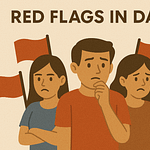Unlocking Online Dating Success: How Psychology Can Help You Find Real Love
Online dating is no longer just a modern convenience—it’s how millions of people meet their partners every year. But while swiping left or right might seem simple, the real key to success goes deeper than your photos or bio. It lies in understanding human psychology.
Whether you’re brand new to dating apps or you’ve been on them for years, using proven psychological principles can transform your experience—and your results.
Why Online Dating Feels So Addictive (and Frustrating)
Online dating platforms are built to satisfy core emotional needs:
- Connection: We all crave companionship.
- Control: Filters and search settings help us feel empowered.
- Validation: Every “like” gives us a mini dopamine hit.
“Online dating taps into the same reward systems that drive social media use,” says Dr. Helen Fisher, biological anthropologist and chief scientific advisor for Match.com. “It offers constant novelty and intermittent reinforcement, which can be addictive.”
The problem? That same appeal can lead to overwhelm, burnout, or shallow interactions if we don’t approach it with intention.
Crafting a Profile That Actually Attracts the Right People
Your profile is your digital first impression—and psychology shows we form judgments in under one second. That’s why a well-lit, natural, and authentic photo is critical.
Psychological Tricks for a Magnetic Profile
- Be real: Studies show that authenticity increases trust. Skip the generic “I love travel” line—instead, describe a trip that changed your perspective.
- Tell micro-stories: A short anecdote about your weekend hobby or why you adopted your dog creates emotional hooks.
- Project warmth: Smiling photos boost attractiveness and make you seem more approachable.
Avoid overly curated selfies or bios filled with buzzwords. Instead, aim for emotionally resonant and honest.
Why We Swipe the Way We Do: The Psychology of Dating App Behavior
Ever wonder why some matches feel promising but go nowhere? Psychology explains a lot:
- The Paradox of Choice: Too many options can actually lead to dissatisfaction and second-guessing.
- Reciprocity Bias: You’re more likely to engage with people who’ve already shown interest.
- Visual Primacy: People judge profiles based 90% on photos before reading bios.
“Dating apps create an illusion of abundance,” explains behavioral psychologist Logan Ury, author of How to Not Die Alone. “But true compatibility is found when you slow down and focus on connection—not perfection.”
Making Conversation Count: How to Spark Real Connection
Generic openers like “Hey” or “What’s up?” rarely go far. Psychologically, people are drawn to messages that show curiosity, thought, and emotional presence
Winning Strategies for Messaging
- Reference their profile: “I saw you hiked Peru—was that your favorite trip ever?”
- Use light humor: Shared laughter builds rapport and positive emotional associations.
- Mirror their tone: Subtle language mirroring builds familiarity and comfort.
The goal isn’t to impress—it’s to connect. Ask questions that invite storytelling, not just yes-or-no answers.
Facing Rejection Without Losing Confidence
Let’s be real: online dating can sting. Matches fizzle, texts go unanswered, and it’s easy to take it personally. But the truth is, rejection online often says more about timing or fit than your worth.
How to Stay Resilient
- Reframe rejection: Each “no” gets you closer to a meaningful “yes.”
- Protect your energy: Take breaks if you feel drained. This isn’t a race.
- Practice self-compassion: According to Dr. Kristin Neff, self-kindness is essential for bouncing back and staying open to love.
“Emotional resilience—not attractiveness—is what determines online dating success,” says dating coach Damona Hoffman. “The people who succeed keep showing up, even after disappointment.”
Turning Matches Into Meaningful Relationships
Once you’ve sparked a connection, how do you take it offline—and make it last?
Psychology-Backed Tips for Relationship-Ready Dating
- Meet sooner than later: Long chats can build false intimacy. A quick coffee date grounds things in reality.
- Choose relaxed settings: Casual environments reduce performance anxiety.
- Look for emotional intelligence: Empathy, curiosity, and active listening are green flags.
Don’t just look for chemistry. Seek compatibility in communication style, emotional needs, and long-term goals.
Common Pitfalls in Online Dating (and How to Beat Them)
Even the best strategies can be derailed by hidden psychological traps:
- Choice overload: Swipe fatigue is real. Narrow your filters and focus on 2–3 matches at a time.
- Surface-level bias: Attractive photos don’t guarantee compatibility. Read bios carefully.
- Perfection paralysis: No one is flawless. Real love comes from acceptance, not idealization.
“The grass is greener where you water it,” reminds therapist Esther Perel. “Focus on growing connection—not chasing the next shiny match.”
Read our report on how to spot fake profiles.
Conclusion: Use Psychology to Date Smarter, Not Harder
Online dating doesn’t have to be a numbers game. By approaching it through the lens of psychology, you can shift from mindless swiping to mindful connection.
- Craft profiles that tell a story.
- Message with intention and warmth.
- Build resilience against rejection.
- Seek compatibility, not just attraction.
Success in love isn’t random—it’s emotional strategy. When you lead with authenticity and awareness, you won’t just find more matches—you’ll find the right ones.
FAQ: Psychology of Online Dating Success
Q: How can I stand out on dating apps?
A: Use clear, friendly photos and write a bio that tells real stories. Personal details are more memorable than generic lines.
Q: Why do I feel burned out by dating apps?
A: It’s called “choice overload.” Limit your daily time and focus on deeper conversations with fewer people.
Q: What makes a great first message?
A: Refer to something specific in their profile. Ask open-ended questions that show genuine interest.
Q: Is ghosting normal? How should I handle it?
A: Unfortunately, it’s common. Don’t internalize it. Move on and stay open—you deserve a response and connection. Why do people ghost? Read our report.




